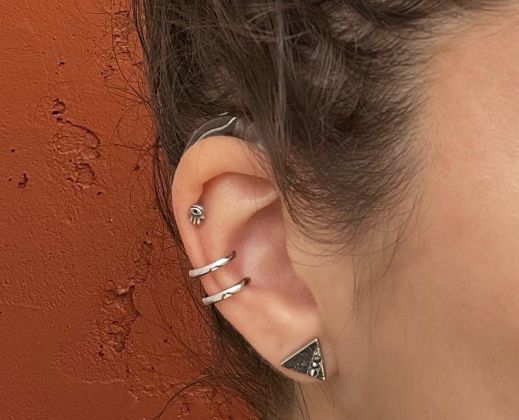|
www.HealthyHearing.com |
Deafmetal jewelry stylishly secures hearing aids and cochlear implantsFounders re-imagine hearing aids as conduit to self-expression
Contributed by Madeleine Burry Aside from audiologists, few people would likely describe hearing aids or cochlear implants as cool. Functional, life-changing, and built with remarkable technology, yes—but these devices are not exactly attractive, fun, or whimsical in nature. 
attaches to the hearing aid via a holster. It doesn't require a piercing and keeps hearing aids in place. Enter Deafmetal, a company that makes innovative, exciting, and downright stylish hearing aid and cochlear implant jewelry. How Deafmetal came to the USAAs a clinical audiologist, Jen Aslin knows the tricks people use to hide hearing aids, from opting for skin-colored devices to strategic hairstyling choices. That’s why she was so intrigued when she saw Jenni Ahtiainen on the list of presenters for the American Academy of Audiology conference back in 2020. In 2018, Ahtiainen, an accessory designer from Finland, got hearing aids. Her initial response was not enthusiastic: “You can choose eyeglasses that suit your own style, no matter if you're a woman, man, child, rocker, hipster or goth. But if you have bad hearing, you are stuck with the ugly-looking machines for the rest of your life,” Ahtiainen writes on the Deafmetal website. Related: Tips for wearing hearing aids and eyeglasses Retention rings, holsters and clip-onsBut then came a moment of inspiration: Ahtiainen created a holster, which acts as a connection point from the hearing aid, transforming the devices into an accessory vehicle. Deafmetal re-imagines hearing aids—instead of hiding them, they’re a conduit to beauty and self-expression. “I liked the idea of being able to bring a hearing loss to the forefront and actually accentuate it with products and make it instill confidence,” Aslin says. Ahtiainen wound up being unable to attend the conference (which took place during the early pandemic) but Aslin reached out—now, she collaborates with Deafmetal, which sells its products around the world, in the United States. Clever, beautiful designs for hearing aids and cochlear implantsDeafmetal makes a few categories of products:
All products can be ordered online—no fittings required—and are suitable for any device with a behind-the-ear component. Deafmetal products are functional, helping keep devices in placeOne advantage of some of the Deafmetal products is that they help to keep hearing aids in place. That's useful if you need to wear a face mask, or for anyone who wears glasses with hearing aids or even hats and other headgear. 
ear piercing. “It’s really easy for a hearing aid to get tangled up,” says Candace Ortiz of Las Vegas. She’s in her 30s and recently got hearing aids. They’re not “plug and play” she notes, recalling getting headaches at first from sensory overload and also having to get accustomed to something behind her ear. Now, she wears a double cuff; it’s simple, without any hanging charms, she says. “It just really helps keep [the hearing aids] secure,” Ortiz says. Before wearing the cuff, when her hair was up on windy days, the wind could knock her hearing aids out of place. There are all sorts of scenarios where having a hearing aid more securely clipped on is advantageous, Aslin points out. That includes anyone who plays sports—and also her customer with Tourette’s syndrome, who shakes her head frequently, and had trouble keeping her hearing aids in place before the Deafmetal product. Deafmetal products are an accessory that meets your styleGlasses “serve a function, but we also pick glasses that suit our personality,” says Monika Curman, of Vancouver, sharing that she sometimes wears contacts but has multiple styles of (oversized, funky, and attention-grabbing) eyeglasses, too. Curman recently started wearing hearing aids and likes that Deafmetal allows her to show some personality. “I thought this was such a wonderful way of embracing your disability,” she says. Curman has three pairs. “I like having my hair up on one side with the whole dangling [jewelry] and it’s like, it’s sexy,” she says. Ortiz also finds the aesthetic aspect of Deafmetal’s products appealing. “I think it looks really cool,” Ortiz says (and her friends on social media agreed when she posted a picture showing the jewelry). The designs are simple (which plays to her tastes) but adds a touch of something aesthetic, she says. Counteracting hearing aid stigmaOrtiz is in her 30s and didn’t imagine she’d need hearing aids—her first association with the devices is her grandparents. Meeting other people with hearing loss, and products like the ones from Deafmetal, have given her a sense of community. Curman likely needed hearing aids earlier than when she started wearing them. (A very typical story!) Her brother wears hearing aids as well, but despite this, when she needed them, it was a moment of vanity, and felt like “an admission of weakness,” she recalls. “And then I thought, ‘Why am I doing this?... I’m not going to be ashamed of this,” Curman says. Instead, she embraced the hearing aids—along with their opportunity to accessorize. Now, it’s clear that her hearing aids are a strength, not a weakness: At work, for instance, they’re a “game-changer” at work, she says, with people noting she appears more confident since she’s no longer struggling to hear, and she’s gone back to theater, doing three plays in the past few years. Madeleine Burry
|
Featured clinics near me
Earzlink Hearing Care - Reynoldsburg
7668 Slate Ridge Blvd
Reynoldsburg, OH 43068

Find a clinic
We have more hearing clinic reviews than any other site!


 Madeleine Burry is a Brooklyn-based freelance writer and editor. She's written about health for several online publications, including Women's Health, Prevention, Health, Livestrong and Good Housekeeping. You can follow her on Twitter @lovelanewest.
Madeleine Burry is a Brooklyn-based freelance writer and editor. She's written about health for several online publications, including Women's Health, Prevention, Health, Livestrong and Good Housekeeping. You can follow her on Twitter @lovelanewest.